Resettlement & Complementary Pathways
ICMC worked with a range of actors to offer people fleeing war, violence and persecution the chance to rebuild their lives in safety and dignity. From supporting new resettlement opportunities to promoting the integration of refugees in their new communities, ICMC sought to open pathways to a more hopeful future.

United States
ICMC’s Resettlement Support Center Turkey and Middle East interviewed more than 3,000 refugees for possible U.S. resettlement and provided pre-departure cultural orientation for more than 1,300.

Croatia
One hundred refugees resettled from Turkey to Croatia with pre-departure and community integration assistance from ICMC’s Resettlement Support Center Turkey and Middle East and ICMC Europe.

European Union
Local communities in nine European countries received integration training using the SHARE Welcoming Communities curriculum developed under ICMC leadership.

March
ICMC Europe co-facilitated a SHARE Network conference on housing and refugee inclusion that aimed to increase regional cooperation by local communities in emerging resettlement countries.

April
The SHARE Network published the third issue of its Magazine, which features ICMC involvement in emerging resettlement in Croatia, the new integration training curriculum and the small welcoming communities video series.

July
ICMC Europe produced a SHARE factsheet on increasing resettlement as a protection tool in response to the 3-year strategy complementing the Global Compact on Refugees and called for civil society involvement.

July
ICMC Europe collaborated with the International Organization for Migration on a closing conference of the LINK IT project, which strengthened connections between pre-departure and post-arrival support for resettled Syrian refugees.

August
ICMC Europe and the SHARE Network created an animated video highlighting how different European countries are using placement policies for resettlement.

October
ICMC Europe presented a promotion clip for the SHARE video series “Small Places, Great Hearts,” with refugee inclusion highlights from Austria, Belgium, France, Italy, Germany, the Netherlands, Portugal and Romania.

October
A SHARE graphic display designed by ICMC Europe focused on efforts by 16 European countries to meet their pledge of resettling 50,000 refugees in 2018-2019.

December
Following the EU pledge to resettle 30,000 refugees in 2020, ICMC Europe published a new SHARE factsheet that advocated for increased cooperation with smaller municipalities.

December
The SHARE Network led by ICMC Europe published a report from its “Expanding Resettlement across Europe” conference bringing together presentations, discussion input and conclusions from the multi-stakeholder gathering.
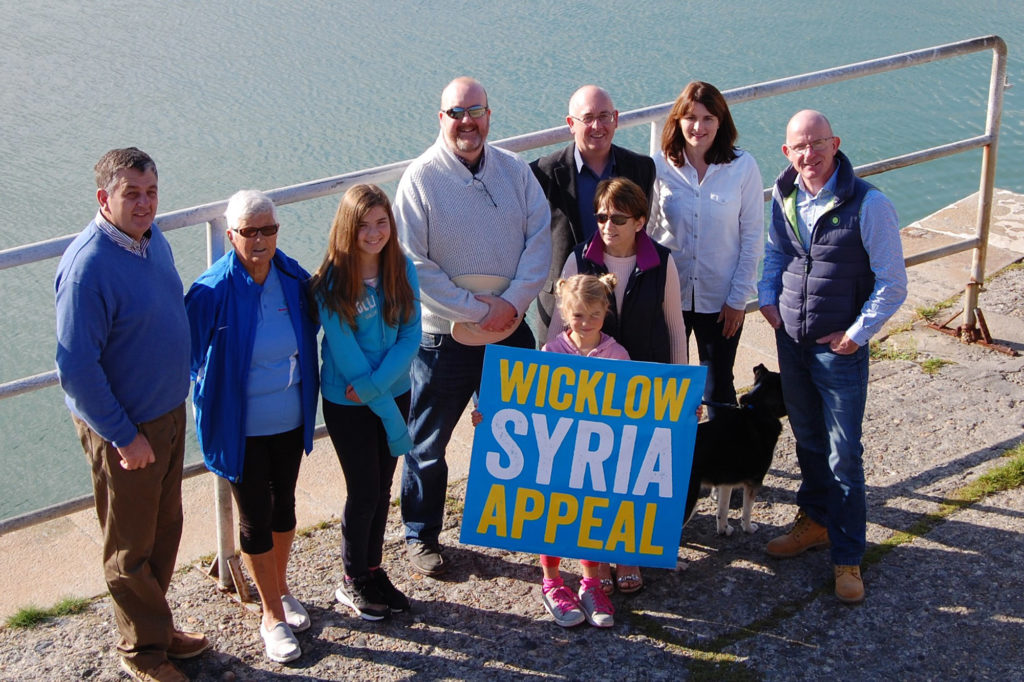 Irish Pioneers of Welcome
Irish Pioneers of Welcome
When a group of residents of the small Irish town of Wicklow set out to welcome a refugee family from Syria, they had little to go on aside from determination.
“We had absolutely no idea how to go about it,” says Michael Nolan, chair of the community sponsorship support group. “We just had a lot of enthusiasm and commitment.”
The group had to find their own way with the help of an NGO in a nearby town. And yet, the road from decision to successful integration of the nine-member Al Sulaiman family took time.
Nolan says this was one of the most challenging experiences he ever faced – but, at the same time, one of the most rewarding things he has ever done.
“We are and will always be there for [the Al Sulaiman family]. When we set out to welcome them, we knew that this involvement had a beginning, but it has no end,” he says.
The family is now fully part of the community, he adds. He wants other communities to take the sponsorship plunge and is working with the ICMC-coordinated SHARE Network to get the word out and improve support systems for interested groups.
Door to a New Life in Safety
Last year ICMC continued and sought to expand its resettlement assistance to governments, an important contribution to increasing global solidarity and protecting vulnerable people who have fled war, persecution and violence in their home country.
For more than three decades ICMC has partnered with the U.S. Department of State, Bureau of Population, Refugees and Migration to provide resettlement processing and associated services for the U.S. Refugee Admissions Program in Turkey and Lebanon. The year 2019 was no exception.
Staff from ICMC’s Resettlement Support Center Turkey and Middle East interviewed over 3,300 refugees as part of their resettlement journey. As well as case management assistance for those awaiting U.S. resettlement, ICMC offered pre-departure cultural orientation sessions for more than 1,300 forcibly displaced people to help ease their transition to a new life in the United States.
In 2019 the long-time expertise of ICMC’s support center in Turkey attracted interest from emerging resettlement countries in the European Union. The EU’s European Asylum Support Office (EASO) selected ICMC to operate a new EASO Resettlement Support Facility (RSF) located in ICMC premises in Istanbul.
Through this innovative pilot project, ICMC expanded its offer of diverse resettlement services to 27 EU Member States and four non-EU-member countries in Europe. The project allowed ICMC to support resettlement missions from Belgium, Bulgaria, the Netherlands and Romania, which involved interviewing and delivering pre-departure orientation for nearly 1,000 refugees. This partnership enables EASO to give States customized support as they fulfill their refugee resettlement pledges. The project also serves as a model for increased cooperation between countries in Europe.
In January ICMC and the Croatian government signed a 12-month agreement outlining ICMC resettlement support for 100 refugees in Turkey. ICMC provided logistic support for interviews and medical screenings of refugees referred by the UN Refugee Agency, UNHCR, and designed and delivered pre-departure cultural orientation classes.
Welcome and Integration in Europe
In 2019 ICMC Europe continued leading the SHARE Network, which brings together a range of actors at different levels working for more and better resettlement opportunities and improved integration in Europe.
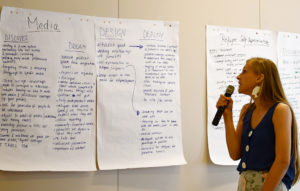
(Re-)Shaping Public Ideas about Migration
Is it possible to shift people’s negative perceptions of migration and uprooted people? Yes, indeed, according to participants at a SHARE Network regional conference in Bucharest, Romania, in June. Co-organized by ICMC Europe, the conference looked at ways to counter inaccurate and often sensationalist narratives used by some politicians and media to manipulate public opinion. It focused on Central and Eastern Europe. The media can play a positive role by including voices of uprooted people and striving for balance in their reporting – portraying migrants and refugees with dignity while also speaking honestly about integration challenges. Social encounter between uprooted people and local communities as well as refugee-led media initiatives are also important.
A joint ICMC Europe-SHARE conference in Brussels in October took stock of Member State efforts in an EU program aiming to resettle 50,000 refugees by the end of 2019.
The conference emphasized the importance of an individualized approach for the success of resettlement as a durable solution, adapted to each person’s situation of forced migration. Participants noted that countries face different challenges to enable refugees to build a new life as members of their host communities and that the experience-based expertise of uprooted people is needed.
The conference also examined experiences with community-based, or private, sponsorships and the role of smaller towns and communities in rural areas – a reflection of the bottom-up approach to welcoming refugees taken by the two-year SHARE Integration project.
ICMC Europe led the second and final phase of SHARE Integration last year, which focused on engaging local communities in smaller municipalities in community-based sponsorships. As these communities are often new to refugee resettlement, the project worked to equip them as welcoming places. To achieve this, it provided them with training adapted to specific contexts, practical resources, exchange of best practices and research to drive evidence-based integration strategies.
ICMC Europe and SHARE partner Caritas Europa published the study “Fostering community sponsorships across Europe” in October. The resource takes a closer look at three sponsorship models, demonstrating their success in engaging local communities, fostering inclusion and transforming attitudes towards welcoming refugees.
“My adjustment to Romania started in a village … I worked at a farm. I had a place to sleep. I had food. I had people to talk to. This was the first door that opened for me and helped me integrate.” — Yeboua “Moise” Moussa Ouattara, refugee from Ivory Coast resettled to Șomcuta Mare, Romania.
Together with the SHARE Network, ICMC Europe produced “Small Places, Great Hearts,” a SHARE Welcoming Communities video series telling stories of successful integration in seven EU countries. Spotlighting smaller cities and towns, the video series includes the voices of different people on the integration journey, from local officials, educators and small business owners to members of NGOs, community support groups and religious institutions. And front and center, resettled refugees themselves. The clips aim to demonstrate the advantages of positive integration and the potential of smaller communities – and inspire others to get involved in welcoming refugees.
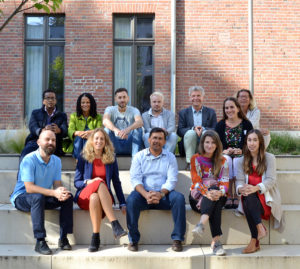
Integration Up Close
How can countries newly engaged in resettlement develop integration programs that work? Taking a closer look at communities experienced in welcoming refugees is one way and the ICMC Europe-led SHARE Integration project gave just that opportunity last September. Members of small municipalities in Belgium, Croatia, France and Portugal had a chance to see integration practices in action during a SHARE “look and learn” visit to Germany. Delegates learned about different NGO and volunteer initiatives to welcome refugees within the Archdiocese of Cologne. Before heading home, participants discussed how to adapt what they had seen to their own contexts.
Prior to World Refugee Day on 19 June, ICMC Europe organized a webinar to launch “Small Places, Great Hearts.” The webinar panel included resettled refugees, local community authorities and SHARE partners. They shared experiences and explored the role of small communities in Europe in welcoming people displaced by war, persecution and violence.
As a resource for emerging resettlement communities, ICMC Europe collaborated with the French Institute of International Relations to publish “Another Story from the Refugee Crisis,” a study on settlement and integration in rural France. Research showed clear efforts by rural communities to welcome refugees. The findings underlined the need for solutions that take into account the whole community, as newcomers and long-time inhabitants often face similar challenges such as lack of transportation or difficulty accessing social services.
This echoed conclusions of a seminar organized by ICMC Europe and SHARE in June as a contribution to the new Cities and Regions for Integration Initiative of the European Committee of Regions. The event featured a panel on improving integration in smaller European communities. The experts found that, as well as posing integration challenges, more remote areas offered better access to employment due to the existence of informal networks that open doors in a way not possible in larger places. In general, the seminar showed the need for strategies tailored to each location and cooperation between different levels of government and civil society.
In 2019 ICMC Europe spearheaded production of SHARE’s Preparing Welcoming Communities Training Curriculum. The resource supports local actors in emerging resettlement countries with little to no experience receiving refugees. The 12 modules cover integration-related topics such as core information, pre-arrival preparation, awareness of vulnerability and the possible need for psychosocial support, labor market access and work with volunteers. In 2019 the curriculum was used to offer training to communities in nine countries.
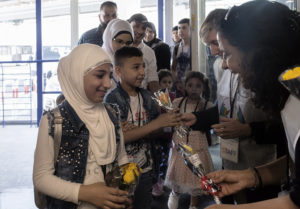
Humanitarian Pathway to a New Life
The UNHCR’s Europe Nansen Award in 2019 put a spotlight on the Italian Humanitarian Corridors program. Since 2015 more than 2,500 forcibly uprooted people have found safe passage and a welcome in local communities in Italy and other European countries thanks to this complementary admission pathway. The ICMC SHARE Network cooperates with Caritas Italiana, the Sant’Egidio Community, the Federation of Evangelical Churches in Italy and the Tavola Valdese (Methodist and Waldensian Churches), which together run the program in agreement with the Italian government. ICMC Europe has been an active advocate for the Italian Humanitarian Corridors, which have inspired similar programs in Andorra, Belgium and France.
ICMC Europe coordinated the SHARE Settlement & Integration Roster of experts who led customized training for local communities in emerging resettlement countries. The sessions focused on the latter stages of resettlement, targeting in-country preparations to lay the foundation for successful integration.
One such training program in Zagreb in March supported integration efforts for refugees being resettled in 2019 under the new agreement with the Croatian government. During the four-day event, ICMC Europe prepared local actors to use the new Welcoming Communities curriculum – including selecting materials for Croatian translation – and SHARE’s local inclusion toolkit. Other Roster experts led sessions on communication, volunteering and responding to trauma, which were selected as priority issues for Croatia.
Through SHARE Integration, ICMC Europe provided a regional cooperation platform for local representatives from emerging resettlement countries in Central and Eastern Europe and the Baltic States to share experiences and pursue solutions to integration challenges.
Member's story
Refuge for the Most Vulnerable
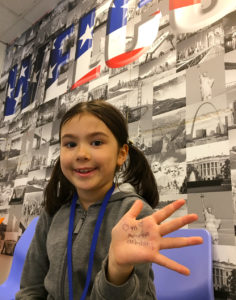
As the U.S. Administration looked to sharply curtail its historic refugee resettlement program at different points during 2019, ICMC’s national member organization in the country insisted on the imperative to welcome those fleeing war and persecution.
The Committee on Migration of the United States Conference of Catholic Bishops (USCCB) called reports in mid-July of the possible “zeroing out” of the program “disturbing” and counter to the nation’s principles. Chair Bishop Joe S. Vásquez pointed out the contradiction of withdrawing a path to life-saving refuge at a time when the world was facing record levels of forced displacement.
Noting that the end of the program would “[leave] refugees in harm’s way and [keep] their families separated across continents,” Bishop Vásquez emphasized the contributions newcomers make to their host communities. He called for the program to be maintained at its historic resettlement goals of 95,000 places per year.
In early September word came of Administration plans to make further cuts to refugee resettlement places, with fewer than 30,000 admissions in 2020. In response Bishop Vásquez and USCCB President Cardinal Daniel N. DiNardo reminded leaders of the country’s tradition of leadership in protecting religious freedom and human rights: “America welcomes refugees; that is who we are, that is what we do.” Pointing to Catholic resettlement ministries since the end of World War I, the statement lifted up the way that refugees have enriched the economic and social life of the country.
“We categorically oppose any further reductions in the refugee resettlement program,” the Catholic leaders stated, rooting this call in striving for a “globalization of solidarity” with refugees as Pope Francis has urged.
When the Administration decided later that month to limit refugee admissions to a mere 18,000 places between October 2019 and September 2020 – a new record low and the third year of mass reduction in admissions – the USCCB again spoke out strongly. Bishop Vásquez said the decision by a former global leader in protecting vulnerable people such as the U.S. to “[turn] a blind eye to those in need with such callous disregard for human life” was “unacceptable” and conflicted with the nation’s fundamental values. The bishops urged that the program be restored to its previous, historic scope.
Further, they expressed concern about the impact of a planned Executive Order giving state and municipal authorities the power to decide whether or not to allow refugees in their communities. They warned that such a move could result in a “confusing patchwork” of refugee welcome and exclusion throughout the country.

